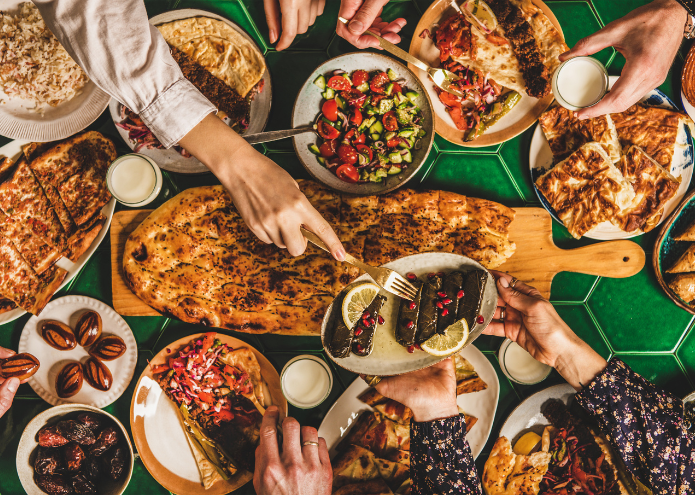Turkey, a country that bridges Europe and Asia, is renowned for its rich and diverse culture shaped by centuries of history, empires, and traditions. As the crossroads of the East and West, Turkey’s culture is a captivating blend of ancient customs, Islamic heritage, and modern influences. Whether you’re exploring Istanbul’s bustling bazaars or marveling at Cappadocia’s unique landscapes, Turkey offers an enriching cultural experience that draws travelers from around the world. Let’s explore some of the key elements that define Turkey’s vibrant culture.
-
The Influence of History and Heritage
Turkey’s culture is deeply rooted in its historical past. It has been home to several great civilizations, including the Byzantine, Roman, and Ottoman Empires, each of which has left an indelible mark on the country. This historical influence is evident in Turkey’s architectural wonders, such as the Hagia Sophia, Topkapi Palace, and the ancient ruins of Ephesus.
Travelers on Turkey tour packages often get the chance to explore these iconic landmarks and delve into the country’s rich historical narrative. The blend of ancient sites and modern cities showcases how Turkey beautifully preserves its heritage while embracing modernity.
-
Turkish Festivals and Celebrations
Festivals in Turkey reflect the country’s cultural diversity and religious traditions. Some of the most celebrated events include:
- Ramazan (Ramadan): As a predominantly Muslim country, Turkey observes Ramadan, a holy month of fasting, prayer, and community gatherings. The festival ends with Eid al-Fitr (Şeker Bayramı), during which families celebrate by sharing sweets and traditional dishes.
- Kirkpinar Oil Wrestling Festival: This unique festival, held annually in Edirne, is one of the oldest sports events in the world and showcases Turkey’s love for traditional wrestling.
- Republic Day (Cumhuriyet Bayramı): Celebrated on October 29, this national holiday commemorates the founding of the Turkish Republic in 1923 with parades, fireworks, and patriotic events.
Experiencing these festivals provides travelers with deep cultural insights and a sense of Turkey’s national pride.
-
Turkish Cuisine: A Flavorful Journey
Turkish cuisine is a delightful reflection of the country’s cultural diversity, offering a mix of Mediterranean, Middle Eastern, and Central Asian flavors. Popular dishes include kebabs, mezes (small appetizers), baklava (a rich, sweet pastry), and dolma (stuffed grape leaves). No visit to Turkey is complete without tasting traditional Turkish tea or coffee, often served with a piece of Turkish delight (lokum).
Street food, such as simit (sesame-covered bread rings) and döner kebabs, also plays a significant role in Turkish culinary culture. Visitors on Turkey tour packages can explore bustling food markets, savor authentic local dishes, and even participate in cooking classes to learn the secrets of Turkish cuisine.
-
Turkish Arts, Music, and Dance
Art, music, and dance are integral to Turkey’s cultural identity. Traditional Turkish music, influenced by Ottoman and Sufi traditions, often features instruments like the oud and ney (reed flute). Folk dances, such as the Halay and Zeybek, are performed during weddings and festivals, reflecting regional traditions.
The famous Whirling Dervishes, who perform the spiritual Sufi dance known as sema, offer a mesmerizing experience that represents the pursuit of spiritual enlightenment. Visitors can witness these captivating performances in cities like Konya and Istanbul.
Turkey is also known for its intricate handicrafts, including handwoven carpets, ceramic tiles, and exquisite calligraphy, which showcase the country’s artistic heritage.
-
Social Customs and Etiquette
Turkish society places great emphasis on hospitality, family, and respect for elders. Guests are warmly welcomed with tea or coffee, and it’s customary to remove shoes before entering someone’s home. The concept of hoşgeldiniz (meaning “welcome”) is deeply ingrained in Turkish culture, and visitors often experience the genuine warmth and friendliness of the locals.
Respect for traditions and customs is important, especially when visiting religious sites like mosques. Dressing modestly and observing proper etiquette during prayers are essential.
Conclusion: Explore Turkey’s Rich Culture with Turkey Tour Packages
Turkey’s culture is a tapestry woven with ancient traditions, historical influences, and modern charm. From its iconic landmarks and traditional festivals to its delectable cuisine and vibrant arts, Turkey offers an unforgettable cultural experience.
To fully immerse yourself in the wonders of this diverse country, consider booking Turkey holiday packages that include visits to historical sites, cultural festivals, and local culinary experiences. Whether you’re exploring the ancient streets of Istanbul or enjoying a traditional Turkish meal in a quaint village, Turkey promises a journey filled with cultural discovery and unforgettable memories.




